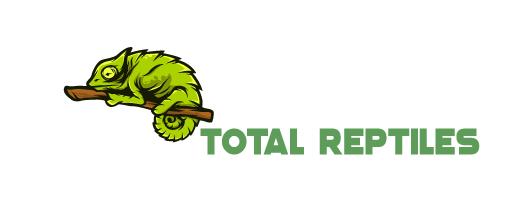When the flies around the house buzz near kitchen scraps, you start to wonder if these are good for your beardie. So, can bearded dragons eat flies?
Pet dragons can eat certain types of flies to a limited extent. While they are completely harmless, they also lack the proper nutrition that a bearded dragon requires for growth and strength.
But what type of flies should you get as snacks? Should you offer wild-caught flies or rely on store-bought ones?
Continue reading our guide based on various research materials to avert misinformation.
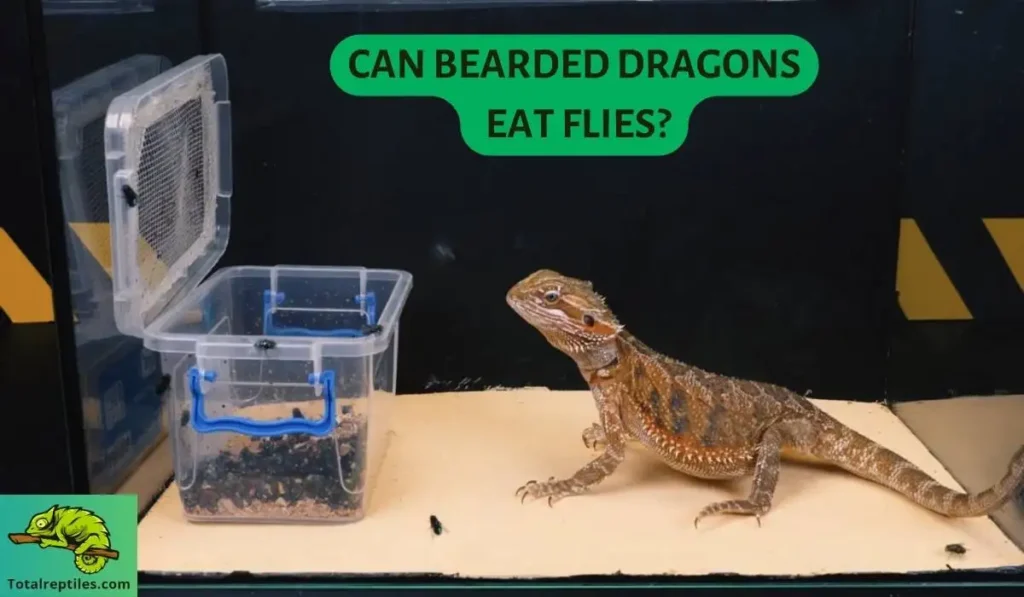
Can Bearded Dragons Eat Flies?
Flies can be friendly insect feeders or deadly ones. It all depends on the type and where you get them.
We strongly recommend obtaining flies from pet stores that sell properly bred items. This will ensure rich and parasite-free insects to consume effortlessly.
In short, your beardie might love a fly or two if it does not shy away from them first. Other dragons may not be interested, but they will gobble these up soon.
Since the dragons are contingent on a varied diet, flies can be one of the occasional snacks to serve.
The Nutritional Value of Flies
Protein is the key compound that adds weight to the nutritional value of a regular fly. Most insects promote remarkable sources of protein, and flies are no different.
Bearded dragon owners usually opt for its larvae (maggots) to provide occasional sustenance that boosts protein and energy.
The flies, on the other hand, hardly cover the required nutrient content the reptile body needs.
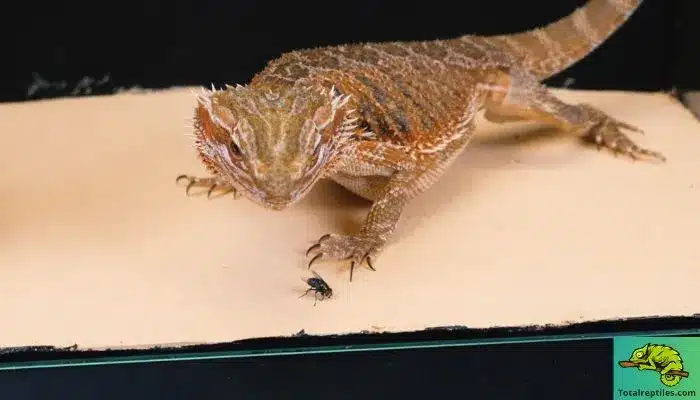
Flies, in general, can have varied nutritional compositions depending on their type and diet. Here is what they offer when consumed:
- Protein (in moderate amounts)
- Fat (in low amounts)
- Minerals like calcium, phosphorus, etc. ( in inadequate amounts)
- Vitamins (in inadequate amounts)
The Risks of Feeding Flies to Bearded Dragons
However, there are negative outcomes to feeding flies constantly. The owner should know these points before making any kind of fly a regular part of the pet’s diet.
- Flies are not a staple food.
- Flies offer poor nutritional balance, as they lack certain essential nutrients.
- Flies can carry pesticide residues if the areas where they are caught use chemical items.
- Flies may also carry parasites, viruses, or bacteria and transmit disease to your beardie.
- Flies can pose a choking hazard if your dragon is inexperienced at feeding or too young.
- Flies may cause allergic reactions in some bearded dragons due to certain components present in their bodies.
- Flies, when big or hard-bodied, can potentially cause impaction (intestinal blockages) if consumed excessively.
What Kinds Of Flies Are Good For Your Beardies?
Note that the flies you feed to your pet must come from reputable and trusted sources where they are specifically bred as insect feeders. This will mitigate the abovementioned risks and is likely to be healthier.
Here are some common fly types that are appropriate for dragons, according to experts:
- Black Soldier Fly Larvae, or BSFL (Hermetia illucens)
- Flightless Fruit Flies (Drosophila hydei)
- Flightless House Flies (Musca domestica)
The BSFL and house flies are often sold commercially, making them an easy find for your pet reptile. On the contrary, you can culture or trap fruit flies at home.
Want to learn more about the bearded dragon diet:
Can bearded dragons eat beetles?
Can bearded dragons eat dead crickets?
Can bearded dragons eat silkworms?
How Often Should Bearded Dragons Eat Flies?
While you can offer flies to a captive bearded dragon, remember that they do not cover the primary portion of the overall varied and balanced diet.
You can feed flies only a few times a week alongside other vegetables and insects to meet their nutritional needs.
Can Bearded Dragons Eat Black Soldier Flies
Yes, black soldier flies are technically larvae, also known as calciworms or phoenix worms.
They are packed with calcium, protein, and moisture, all of which provide excellent nutrients. BSFL are almost chitin-free, making them one of the most ideal snacks for your pet dragon.
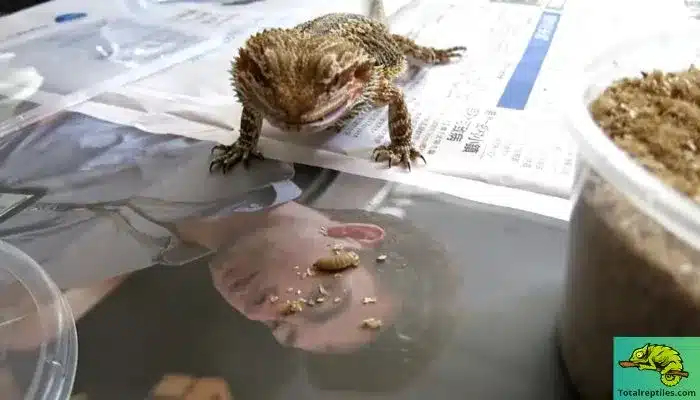
The nutritional composition of BSFL may vary slightly due to the different conditions they were raised in. Still, the table below shows a general estimation of the content:
| Nutrient | Approx. Amount per 100g |
| Moisture | 60-70g |
| Protein | 17-20g |
| Fat | 6-7g |
| Calcium | 5-6g |
| Phosphorus | 0.7-1.2g |
| Ash | 4-5g |
| Fiber | 9-10g |
Can Bearded Dragons Eat Butterflies
Butterflies are as wild as a moth outdoors. You never know what kind of diseases or parasites they may carry. Although butterflies are extraordinary to look at, they may contain potentially toxic substances that can be lethal to your beardie.
So, avoid feeding butterflies to your reptile, no matter how appetizing they may appear.
Can Bearded Dragons Eat Dragonflies
Yes, but we recommend not feeding them to your dragon. There are high chances of dragonflies carrying pesticides and parasites. Bearded dragons are quite strong, but even they are defenseless against harmful ailments.
It is safer to opt for healthier insect options to balance the pet’s diet.
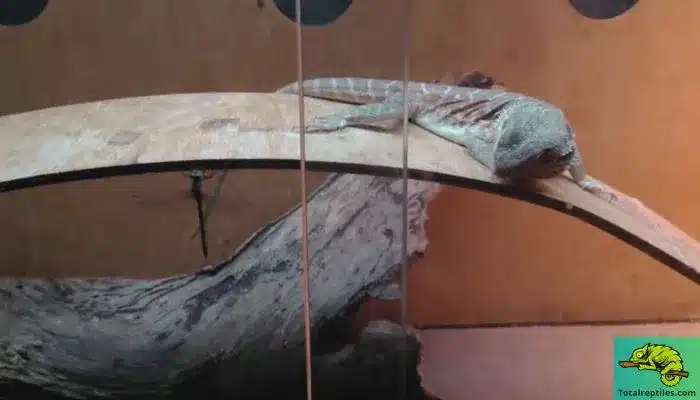
Can Bearded Dragons Eat Fruit Flies
Fruit flies are one of the popular choices for feeding juveniles or small beardies. You can trap or culture them at home to provide a suitable size for consumption.
However, it should be served in combination with other edible insect and vegetable matter to obtain proper nutrition.
| Nutrient | Approx. Amount per 100g |
| Moisture | 70-80g |
| Protein | 8-12g |
| Fat | 3-5g |
| Calcium | 0.1-0.2g |
| Phosphorus | 0.1-0.2g |
| Ash | 0.5-1g |
| Fiber | 0.5-1g |
Can Bearded Dragons Eat House Flies
Yes, but it is better to offer them to adult or mature bearded dragons due to their large size. Since these flies are often given to different pets, they are easily available on the market as feeder insects.
| Nutrient | Approx. Amount per 100g |
| Moisture | 65-75g |
| Protein | 14-20g |
| Fat | 4-7g |
| Calcium | 0.2-0.4g |
| Phosphorus | 0.2-0.4g |
| Ash | 1-2g |
| Fiber | 1-2g |
Can Bearded Dragons Eat Spotted Lanternflies
Spotted lanternflies do not offer optimal nutritional value to bearded dragons. Therefore, it is often advised against by vets and experienced pet owners.
Moreover, they secrete toxins from their bodies, making them harmful snacks for beardies. Even if your pet catches one by chance, be sure it does not swallow it.
Conclusion
So, can bearded dragons eat flies? Your reptile companion will enjoy this unique treat, though do not make it an unbreakable habit.
Remember that flies may be exposed to pesticides or carry various diseases due to their feeding nature. As an outcome, obtain only the kinds that a reliable pet store sells as a feeder.
Flies offer healthy protein, but these should not be the only component of a dragon’s diet. Variety is the key to your beardie’s happiness.
Hence, try to offer a diverse range of greens and insects with a sporadic taste of healthy flies.
References & Resources
- Kubiak, Marie. “Bearded dragons.” Handbook of Exotic Pet Medicine (2020)
- Wang, Yu-Shiang, and Matan Shelomi. “Review of black soldier fly (Hermetia illucens) as animal feed and human food.” Foods 6.10 (2017)
